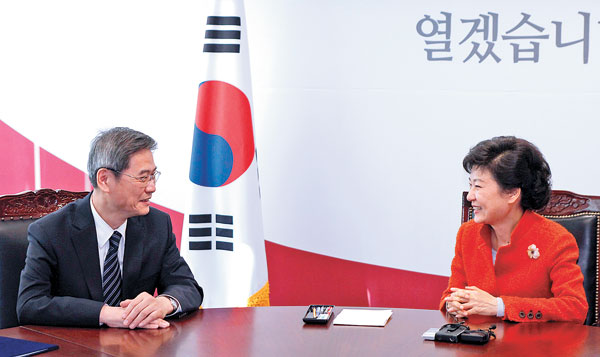| ?
 Vice-Foreign Minister Zhang Zhijun meets Republic of Korea’s President-elect Park Geun-hye at her office in Seoul on Thursday. [Photo/Agencies]
|
Republic of Korea President-elect Park Geun-hye on Thursday said Pyongyang's nuclear weapons development cannot be tolerated, but the doors for dialogue and humanitarian aid will be left open, one of several moves that Beijing has expressed support for.
Park made the remarks during a meeting with Zhang Zhijun, a special envoy and vice-foreign minister of China, Yonhap News Agency reported.
It was the first such meeting between Park and a senior diplomat from Beijing since her election victory and the rocket launch by the Democratic People's Republic of Korea in December.
Zhang expressed support for the so-called trust-building process Park proposed to mend ties with the DPRK, Yonhap News Agency reported.
The improvement in their relations is in line with the interests of all people on the Korean Peninsula and will be conducive to maintaining regional peace and stability, Foreign Ministry spokesman Hong Lei said.
Experts said the meeting amid both sides' leadership transitions showed their readiness to boost ties and coordinate with each other to ease tensions on the Korean Peninsula.
The more common ground Beijing and Seoul share on the Pyongyang issue, the more the tension, newly stirred by the launch, could be eased and there could be a return to the Six-Party Talks framework, said Huang Youfu, a professor of Korean studies at Minzu University of China.
The West and Seoul condemned the launch as a disguised test of missile technology that is banned under UN Security Council resolutions. Pyongyang insisted it was part of a peaceful space program.
ROK-DPRK relations have seen positive developments as Park's transition team is considering easing sanctions that outgoing President Lee Myung-bak imposed on Pyongyang in 2010. DPRK top leader Kim Jong-un also talked about improving ties with Seoul in his New Year speech.
But Zhu Feng, a professor of international relations at Peking University, said a breakthrough in such relations is unlikely to happen as Park basically shares similar conservative views with her predecessor.
Zhang's visit would help Beijing know more about Park's vision for the peninsula and encourage related parties to grasp the opportunities to restore ties, said Zheng Hao, a commentator for Phoenix Television.
Zhang, who arrived in Seoul on Wednesday for a three-day visit, also delivered a letter to Park from China's top political leader Xi Jinping, Yonhap said.
"I am hoping the new governments that will come to power in both countries will substantiate the strategic cooperative partnership, and I will make efforts to that end," Park told Zhang.
On Thursday, Zhang also met ROK Foreign Minister Kim Sung-hwan. Kim said bilateral ties have made significant progress over the past five years and called for more exchanges between the two nations.
Liu Yedan contributed to this story.
Contact the writer at zhaoshengnan@chinadaily.com.cn